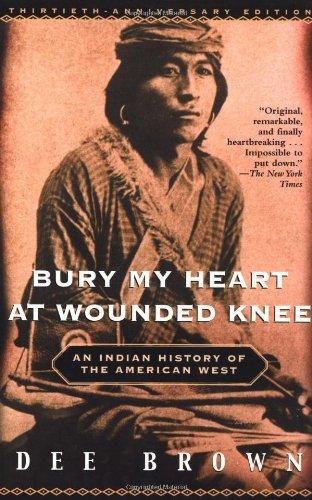folini reviewed Bury My Heart at Wounded Knee by Dee Brown
Review of 'Bury My Heart at Wounded Knee' on 'Goodreads'
5 stars
After a few years sitting on my shelves, in the last couple of weeks, I started and finished the book Bury My Heart at Wounded Knee by Dee Brown. It’s an iconic and popular book, with thousands and thousands of online reviews, so it’s tough for me to add anything new to the conversation.
In this book review, I would state my impressions and thoughts without going over the content of the book.
First of all, let me say that this is a critical book. It tells a piece of American history that has mostly been hidden to the average American. We all know that history is usually told and shaped by the winners. Thanks to this book, we have access to a different version of history. This version is coming from the native Americans’ perspective, from the people who lost the war, although the author is not a Native American. It’s the story of a war Indians didn’t initiate, they didn’t want, and that took the lives of the majority of them.
Ths book goes through a long list of conflicts between mostly peaceful Indian tribes and the expanding American population. Sometimes the pressure comes from miners, other times from farmers, or the builders of the railway. Every single time, the political establishment and the military support the aggressions of the Indians and their killing or imprisonment. As we all know, the government of the United States forced the few surviving Native Americans into small reservations. Indian Reservations were established in areas so inhospitable and hard to cultivate that did not attract any interest from the colons or the gold miners. The list of Indian-American conflicts is also a list of treaties that Americans always violated to take advantage of the native people.
The greed for land, natural resources, and easy money was the main drive pushing colons and miners to the west. The immense and unprecedented land grab didn’t stop until the last piece of valuable land was under the control of the whites.
If there is a lesson we can learn from those tragic historical events and the genocide of the Native Americans is that the greed, the real engine of the capitalistic system, only stops when it runs out of resources to grab or steal and to convert into money.
I see this book and the tragic story of the Native Americans as a metaphor for the current struggle of those trying to save our planet form the exploitation by the capitalistic system. In the 1800 century, Americans colons and business people didn’t stop until they had full control of the natural resources and territories of Native Americans. Similarly, today’s capitalistic system will not stop until our planet resources are exhausted, even if this means to push global warming to a level that puts us, humans, in danger of extinction.

